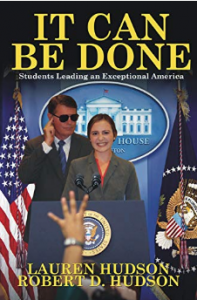Columns for families based on the book “It Can Be Done” @studentsleadusa
President Thomas Jefferson once joked “I’m a great believer in luck and I find the harder I work, the more I have of it.”
Just about every successful person agrees that work comes before success. In other words, “lucky breaks” usually occur after our work ethic moves us into the best position to take advantage of life’s opportunities.
The need for a strong work ethic is another part of American life so important we need two columns to cover it. Today’s column explains how crucial work ethic will be to our future exceptionalism as individuals. Next week we address how work ethic continues to be a key factor for the entire country’s success.
If having a great work ethic were easy, everybody would have one. Exceptional people overcome “work ethic enemies,” beginning with a simple desire at times not to work. Leisure time almost always seems like more fun than work, but even if at times we think of “work” as all or mostly bad, we will have experiences which tell us otherwise.

Some of our very best days will come from the sense of accomplishment we have following a long day’s work. President Franklin D. Roosevelt said, “Happiness lies in the joy of achievement and the thrill of creative effort.” Americans who learn this have a great chance to become exceptional.
What if we don’t like our work on our first job? Lots of people don’t, but our first job will not be our best job. Doing well on our first job can lead to another job we like better. For example, ten years after we leave that first job our first employer’s recommendation might help us land the best job of our lives.
What if we don’t like our pay? Almost nobody starts at the top. If we finish school and we want to climb higher, we probably have decades in our work lives left to get there. Our first job shouldn’t be our last job, nor should it be our highest paying job.
Making money is mostly about our knowledge, skills, abilities and work ethic. The more job value we provide in the marketplace, the more we will make. The work we do today will determine whether we move down, sideways, or up. Many people start at a government minimum wage, but most people later earn much more money.
What if we must work long hours? We all need breaks and we need lives outside work. As young people, we can choose to think of longer work hours differently. If we work on a complex job, longer hours mean we’ll be learning the job more quickly. It takes many years to master some jobs, but the long hours won’t last forever. People who work hard and make their mark when younger often have far more leisure time when they’re older and “established” in a career.
What if we do our best, but we fail at a job anyway? Nobody promised us a job lasting forever and nobody will guarantee we’ll always be treated fairly. If we failed big, there’s a good chance we weren’t meant for that job in the first place. Failure can be life’s way of sending us in a different, better direction.

Some of our most successful Americans succeeded only after they failed again and again. All of us will have wins and losses, successes and failures. Whatever path we choose, whether working for an employer, in a household, or both, the desire or determination to work hard will help. People who have a great work ethic and keep trying almost always become exceptional.
Next week when we further explore the importance of a strong work ethic to America’s success. Frost Brown Todd Member LLC Rob Hudson is a Past Chair of the Northern Kentucky Chamber and a recipient of its Frontiersman Award. 2018 Independent Author of the Year Lauren Hudson is a Singletary Scholar at the University of Kentucky.
















